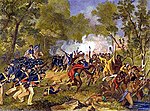The Battle of Tippecanoe was fought on November 7, 1811, between United States forces led by Governor William Henry Harrison of the Indiana Territory and forces of Tecumseh's growing American Indian confederation led by his brother, Tenskwatawa. In response to rising tensions with the tribes and threats of war, an American force of militia and regulars set out to launch a preemptive strike on the headquarters of the confederacy. The battle took place outside Prophetstown, at the confluence of the Tippecanoe and Wabash Rivers.
Although the Americans were victorious both tactically (as they held their ground and Prophetstown was destroyed the next morning) and strategically (Tecumseh's confederacy never recovered), the win was costly as the tribes attacked with fewer men and sustained fewer casualties. The battle was the culmination of rising tensions in a period sometimes called Tecumseh's War, which continued until his death in 1813. The battle was an important political and symbolic victory for the American forces and a devastating blow to the confederacy which never regained the strength it had before the defeat. Public opinion in the United States blamed the uprising on British interference and Tippecanoe was one of the catalysts that resulted in the War of 1812 only six months later.
